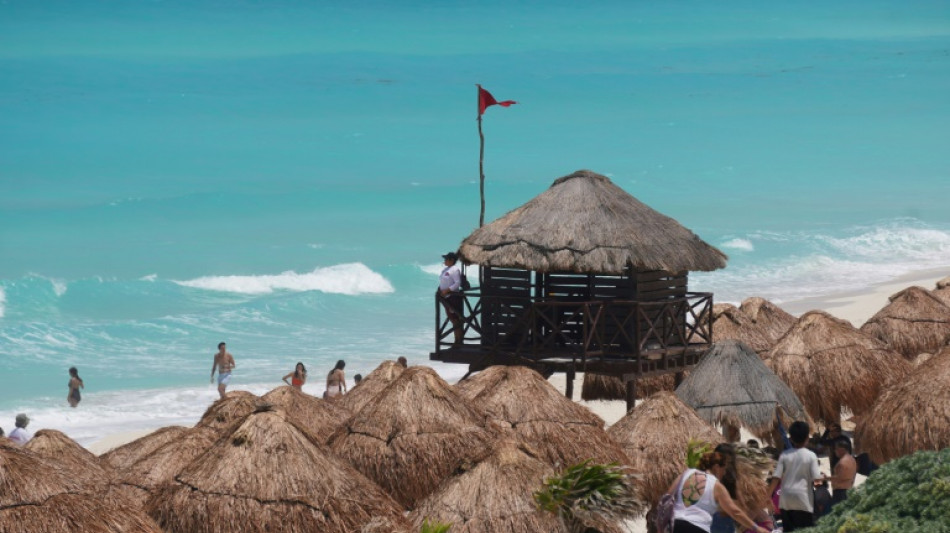

Hurricane Beryl churns towards Mexico after hammering Jamaica
Deadly Hurricane Beryl powered towards Mexico late Wednesday, after battering Jamaica's southern coast with devastating winds and sea surge.
The Category 4 storm has left a trail of destruction in its path across the Caribbean, killing at least seven people as it has strengthened rapidly.
Beryl was pulling away from Jamaica late Wednesday and was expected to pass just south of the Cayman Islands overnight, before moving onward to Mexico's Yucatan Peninsula, the US National Hurricane Center (NHC) said.
The storm is the first since NHC records began to reach the Category 4 level in June and the earliest to reach Category 5 in July.
Mexican officials are scrambling to prepare, with Beryl expected to bring damaging winds, a dangerous storm surge and heavy rainfall over the Yucatan Peninsula and Belize.
"We will have intense rains and wind gusts" from Thursday, Civil Protection national coordinator Laura Velazquez said, announcing the deployment of hundreds of military personnel, marines and electricity workers in anticipation of damage.
The government has prepared 112 shelters with a capacity for around 20,000 people and suspended school in the state of Quintana Roo, where Beryl will likely hit.
In Jamaica, "life-threatening flash flooding and mudslides from heavy rainfall" were still expected overnight, the NHC said.
More than 400,000 people were without power, according to the Jamaica Gleaner newspaper, citing a public service company.
The devastating hurricane-force winds, life-threatening storm surge, and damaging waves that continue to damage Jamaica are expected in the Cayman Islands overnight, when Beryl passes by while at or near major hurricane intensity.
Jamaica Prime Minister Andrew Holness had declared a curfew from 6:00 am to 6:00 pm across the island of 2.8 million and urged Jamaicans to comply with evacuation orders.
Desmon Brown, manager of the National Stadium in Kingston, said his staff had scrambled to be ready.
"We've taped up our windows, covered our equipment -- including computers, printers and that sort of thing. Apart from that, it's mainly concrete so there's not much we can do," Brown told the Jamaica Observer newspaper.
As of Wednesday night, Beryl was packing maximum sustained winds of 130 mph (215 kph), said the NHC.
- 'No communication' -
Beryl has already left a trail of death with at least three people killed in Grenada, where the storm made landfall Monday, as well as one in St Vincent and the Grenadines and three in Venezuela.
Ralph Gonsalves, prime minister of St Vincent and the Grenadines, said that it would take a "herculean effort" to rebuild after the substantial destruction and that "90-odd percent of the houses were blown away" on Union Island.
"Most of the country doesn't have electricity, and more than half without water at the moment," he said.
Grenada's Prime Minister Dickon Mitchell said the island of Carriacou, which was struck by the eye of the storm, has been all but cut off, with houses, telecommunications and fuel facilities there flattened.
The 13.5-square mile (35-square kilometer) island is home to around 9,000 people. At least two people there died, Mitchell said, with a third killed on the country's main island of Grenada when a tree fell on a house.
In St Vincent and the Grenadines, one person on the island of Bequia was reported dead from the storm, while a man died in Venezuela's northeastern coastal state of Sucre when he was swept away by a flooded river, officials there said.
- Climate change -
It is extremely rare for such a powerful storm to form this early in the Atlantic hurricane season, which runs from early June to late November.
Warm ocean temperatures are key for hurricanes, and North Atlantic waters are currently between two and five degrees Fahrenheit (1-3 degrees Celsius) warmer than normal, according to the US National Oceanic and Atmospheric Administration (NOAA).
"Disasters on a scale that used to be the stuff of science fiction are becoming meteorological facts, and the climate crisis is the chief culprit," he said Monday, reporting that his parents' property was damaged.
R.Verbruggen--JdB



